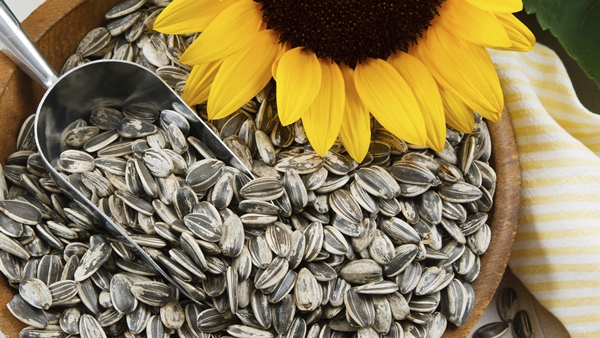
Aeschylus is often known as the father of ancient Greek tragedy plays. He once said, “From a small seed a mighty trunk may grow.”
When you plant a seed, after a while the results start to show. This is exceptionally true when you plant sunflower seeds into your body. One of the key results is lower blood pressure.
Sunflower seeds are a standard at ballparks for the players as well as for the fans enjoying the baseball game. But this superseed is one of the foods that lower blood pressure. Stress and excessive alcohol consumption are a couple factors contributing to high blood pressure. One handful of sunflower seeds can help lower your blood pressure from the intensity of the close baseball game, or from the number of beers that go down with it.
You want to choose unsalted seeds, which won’t have a high sodium content. The roasted and salted sunflower seeds contain 47 mg of sodium per quarter cup, compared to none in roasted unsalted sunflower seeds. Salt is that hidden ingredient that can raise your blood pressure.
This snack should always be eaten unsalted to maintain your healthy lifestyle because of its abundance of nutrients, including fiber, folic acid, protein, manganese, copper, tryptophan, magnesium, selenium, phosphorus, and vitamins E, B1, and B6.
Do Sunflower Seeds Lower Blood Pressure? Know the Factors That Might Help
1. High Source of Vitamin E
In just a quarter cup of sunflower seeds, you are getting 61.5% of your daily value of vitamin E. The fat-soluble vitamin is essential for proper use of vitamin K and for making red blood cells.
Studies indicate that vitamin E helps lower your blood pressure and sunflower seeds are your best food source for the nutrient. Another good source is almonds, so why not mix these foods that lower blood pressure together for a homemade trail mix?
2. Release Proteins
Sunflowers are a good snack for protein, with 2.5 g per quarter cup. During the digestion process the seed releases bioactive peptides (proteins), which reduces an enzyme production that helps lead to high blood pressure.
3. Fiber Lowers Blood Pressure
The seeds are considered a good source of dietary fiber (soluble and insoluble) with 3 g per quarter cup and 12% of your daily value intake. The sunflower seed’s fiber contributes to the whole package of nutrients that help lower your high blood pressure.
Research has found through 25 studies that a high-fiber diet can significantly lower blood pressure. To stay healthy, add foods that lower blood pressure like sunflower seeds to your diet.
4. Good Source of Magnesium
The magnesium within sunflower seeds is essential for healthy bones and energy. It also helps reduce asthma, prevent migraines, lower blood pressure, and reduces the risks of stroke and heart attack. Sunflower seeds contain 28.4% of your daily value of magnesium.
When the body doesn’t have enough magnesium, this leads to high blood pressure and other dangerous conditions—a reason why you must add foods that lower blood pressure, especially ones high in magnesium, to your diet.
Now that you’ve ran the bases, you know that sunflower seeds are a real home run to lower blood pressure. The next time you’re at the ballpark, instead of munching on hot dogs and gulping beer, plant some unsalted sunflower seeds in your mouth for lower blood pressure and better overall health.
Related:
Sources:
“Sodium in Sunflower Seeds,” Fat Secret web site; http://www.fatsecret.com/calories-nutrition/food/sunflower-seeds/sodium.
“Lower blood pressure by eating less salt,” Blood Pressure UK web site; http://www.bloodpressureuk.org/BloodPressureandyou/Yourlifestyle/Eatingwell/Salt.
“Sunflower seeds,” The World’s Healthiest Foods web site; http://www.whfoods.com/genpage.php?tname=foodspice&dbid=57.
Shu, C., “Food: Surprising Sunflower Seeds,” Psychology Today web site, Sept. 1, 2005; http://www.psychologytoday.com/articles/200509/food-surprising-sunflower-seeds.













